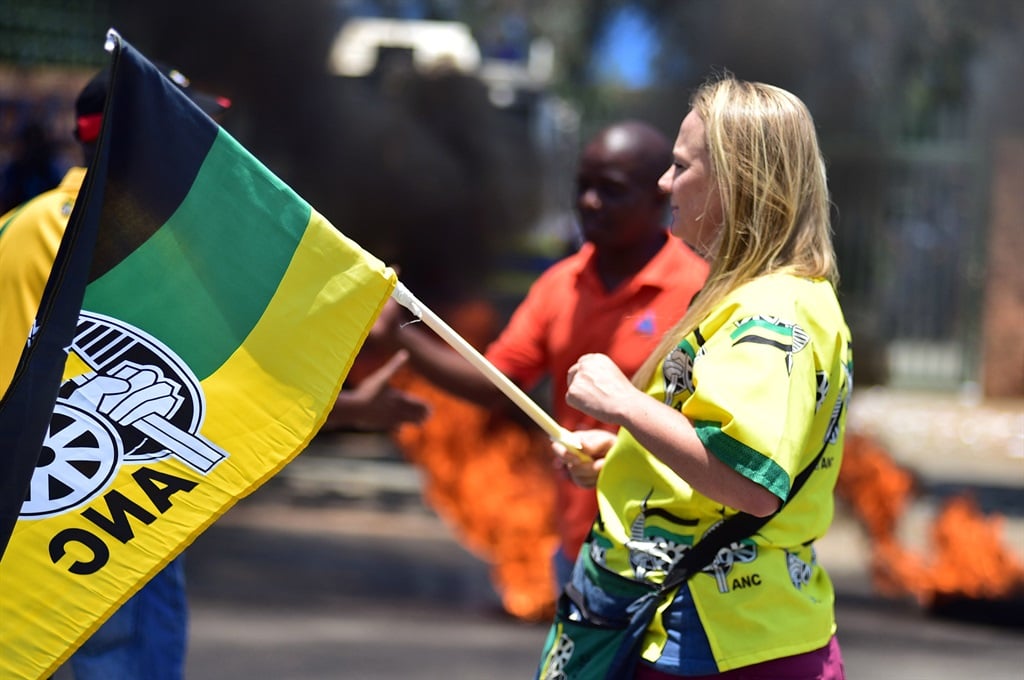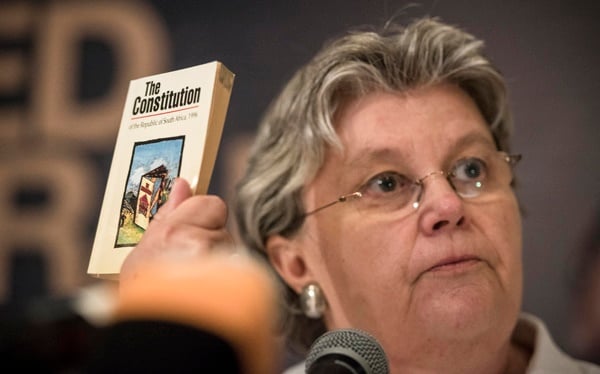
The ANC’s political leaders – then President Jacob Zuma, justice minister and SACP leader Jeff Radebe, and former ANC youth league leader, Julius Malema – demonised the former jailed member of uMkhonto weSizwe, Barbara Hogan, when she was public enterprises minister in 2009.
Zuma sacked Hogan as minister the next year.
To the ANC’s and South Africa’s collective shame, state capture was well under way. All of those leaders are covered in shame.
Six years later, in December 2015 – and two years before ANC removed Zuma as president – Hogan denounced him for sacking Nhlanhla Nene as finance minister, and called on the people of South Africa to “rise up and say enough is enough”.
The crime for which those heroes pilloried her in 2009 was that she preferred to appoint Sipho Maseko as chief executive of Transnet instead of Siyabonga Gama, their favourite.
She was declared to be against transformation in the ANC, and to be against empowerment of black people.
Gama was fired as chief executive of Transnet last month.
As Ferial Haffajee reported last week from the state capture inquiry under Deputy Chief Justice Raymond Zondo, “Siyabonga Gama had huge political support at this time: Gwede Mantashe and former South African National Defence Force general Siphiwe Nyanda as well as the Tripartite Alliance and Satawu, the biggest union at Transnet.”
This was despite the fact that Gama was facing charges at the same time relating to tender irregularities in connection with his award of an R18 million contract.
Instead of putting facts on the table to justify Gama as their preferred candidate rather than Maseko, they chose the sinister route of saying the white comrade did not want transformation.
Hogan tried in vain to appeal to their conscience, seeking protection from Zuma without success.
As she told the state capture inquiry, “the president hung me out to dry”.
The ANC Youth League, then under Malema, alleged there was a “concerted agenda by the predominantly white board of directors” of Transnet, as well as “external players”, to “isolate” Gama and “deny him the position of group chief executive.”
One could be forgiven for thinking that Maseko is a white man.
Gama was reinstated as head of Transnet freight division in March 2011, and appointed acting chief executive of the group in April 2015.
Brian Molefe was appointed chief executive in February 2011, when Transnet had been without a permanent appointee for almost two years.
Race has been a factor in ANC politics before and after the advent of the Freedom Charter at the Congress of the People in Kliptown in 1955.
The Pan Africanist Congress under Professor Robert Sobukwe and Potlako Leballo was formed in rebellion against the ANC, working together with whites who were members of the Congress of Democrats and the illegal South African Communist Party.
The PAC was formed most specifically in rebellion against the preamble in the Freedom Charter that South Africa “belongs to all who live in it, black and white”.
The PAC was and is still against this declaration that South Africa belongs to all who live in it.
The race factor emerged again after the 1969 ANC Morogoro consultative conference, when Ambrose Makiwane, Tennyson Makiwane, Jonas Matlou, Alfred Kgokong, former ANC president Albert Luthuli’s son-in-law Pascal Ngakane and three other members of the so-called “Gang of Eight” were expelled in 1975 for their unwillingness to work with other races.
They had opposed the decision of the Morogoro conference in Tanzania to include whites, Indians and coloureds for the first time as members of the ANC (but not of the National Executive Committee), even though Umkhonto weSizwe (MK) had been founded in 1961 on a non-racial basis.
There was no race factor in MK when members of the first high command, under Nelson Mandela, faced the death penalty in the Rivonia Trial in 1963/64.
This issue of race emerged again in ANC in 1985 in preparations for the Kabwe consultative conference in Zambia, when discussion papers were circulated motivating for non-racial membership in all ANC structures, including the national executive committee.
Kabwe conference transformed the ANC into a completely non-racial organisation for the first time since its establishment in 1912.
True, John Pule Motshabi – a member of the national executive committee of ANC and central committee member of the SACP, who passed away in Lusaka in 1988 – is said to have opposed this move, declaring that ANC in exile did not have the mandate to take this decision and needed to wait until we returned to SA to place the proposal at a fully constituted ANC conference.
Despite this opposition, the Kabwe conference resolved to include all races in the national executive committee and it became a fully non-racial organisation from 1985 onwards.
We have to commend the positive contribution of the SACP to non-racialism in the ANC and South Africa throughout those years of armed struggle.
No other political organisation in South Africa had such an influence on this issue, leading to the non-racial character of the interim Constitution in 1993 and the final Constitution of 1996.
At the advent of democracy ANC landed as a non-racial organisation with blacks, whites, Indians and coloureds in all structures, from the branch to the national executive committee.
It is shocking that Hogan – a member of the ANC sentenced to 10 years in prison for high treason on behalf of MK for which she served eight years and one year in solitary confinement – faced racist slurs and innuendos in 2009 from members of the national executive committee of ANC, members of the SACP and the transport workers union, Satawu, when she was a government minister.
It is shameful but not surprising. Those who do not have facts to defend their questionable standpoints always rush to use race to intimidate their opponents who have a different skin colour.
This is why it is still difficult for white comrades to stand firm against wrongdoing in the ANC, because they are sometimes reminded of their colour for blackmailing purposes.
It is a disgrace in the 21st century ANC, and a stain on our history. It was not for this that Ruth First was blown up in Mozambique by apartheid security police in 1982, and the wife and daughter of ANC comrade Marius Schoon – a former political prisoner – also blown up in Angola in 1984.
Comrade Barbara Hogan was axed on October 31 2010, and was succeeded by Malusi Gigaba.
Luthuli House ordered Gigaba to resign last week, conveyed directly by President Cyril Ramaphosa.
History has proved Hogan right. Gama continued to destroy everything that was good in Transnet, presiding over the rampant looting.
The use of racism to intimidate Hogan, and stop her from appointing the competent Maseko, was to facilitate looting at Transnet, as the record shows.
Brain Molefe’s conduct is expected to be questioned by Pravin Gordhan at Judge Zondo’s inquiry this week.
In a similar situation to what was faced by Hogan, the ANC MPs Andrew Feinstein and Laloo Chiba were ostracised in 2001 for demanding accountability on the arms deal saga in parliament under President Thabo Mbeki. The race factor has been used again and again.
The ANC in exile operated as both a political party and government in waiting. Party and future government were fused as one unit.
It had chief representatives who acted like ambassadors across the world in all continents, it had military camps in Angola, Tanzania and Uganda, and it operated Quatro prison camp in Angola, which was later transferred to Uganda.
In the ANC the relationship between political party and state has been blurred since it went to exile. The blurring continues to this day.
This is why Zuma as South African president ordered Hogan to appoint Gama. It was an order not to be defied, contrary to the ethics of corporate board administration.
It will take different parliamentary electoral laws to separate the party from the government and state.
Hence the need to reform the parliamentary electoral laws and allow voters to elect for themselves members of parliament as individuals who will be accountable to the South African Constitution and to the voters who elected them – not just to any party leader.
• Makgoale is a rank file member of the ANC. These are his personal views




 Publications
Publications
 Partners
Partners









